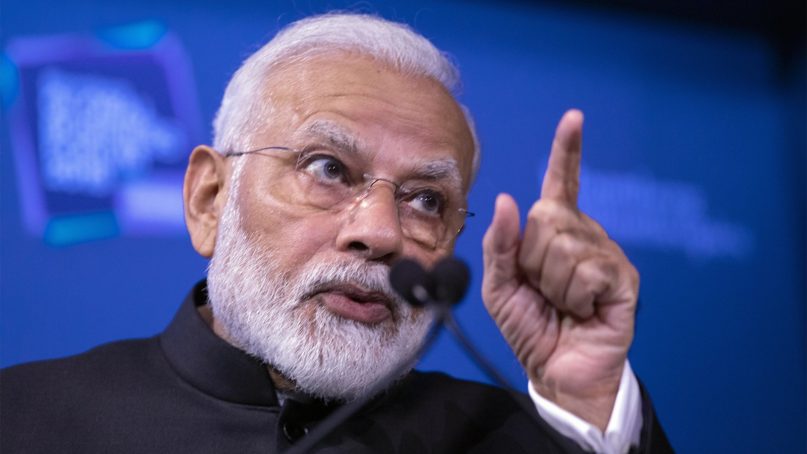(RNS) — Watching some 50,000 of her fellow Indian Americans line up outside a Houston stadium to see Prime Minister Narendra Modi take the stage at last month’s “Howdy Modi” rally, Sarah Philips felt sick.
“As an Indian Christian who grew up in this city … I stand here disgusted that a man who is responsible for persecution against religious minorities, violence against Dalits and so much more evil is standing in that stadium,” Philips, an organizer with Azaad Austin, declared into a megaphone at the South Asian American-led protest she helped coordinate against the rally on Sept. 22. “You are celebrating a man who has a singular view of what India is: a Hindu state. That view is violent, and you aren’t celebrating us.”
The opposition to Modi and his party’s Hindu nationalist agenda has largely been framed as a conflict between Hindus and Muslims — who comprise India’s largest minority as well as majorities in Pakistan and Kashmir.
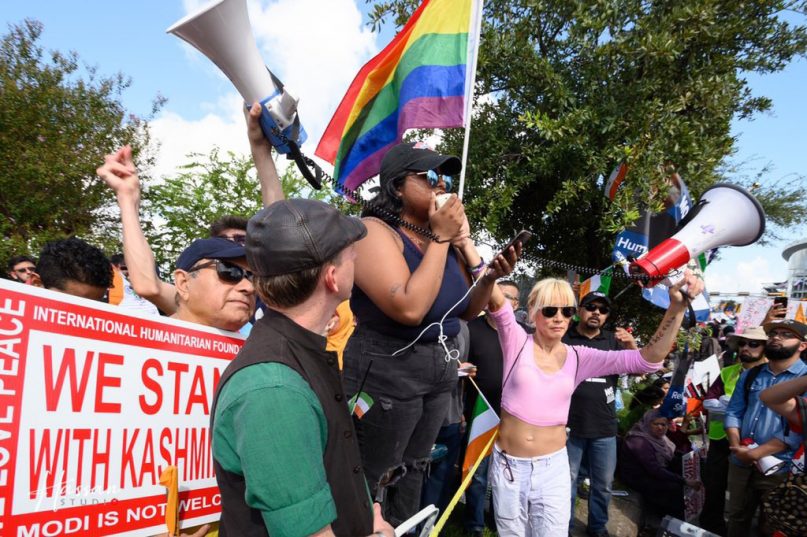
Sarah Philips, center, helps lead a protest against a rally welcoming Indian Prime Minister Narendra Modi on Sept. 22, 2019, in Houston, Texas. Courtesy photo
But Philips’ family, which immigrated to Houston from the Indian state of Kerala in the 1970s, is Catholic.
From mob violence to anti-conversion laws to clampdowns on churches, the effects of rising Hindu nationalism under Modi have left India’s estimated 28 million Christians — who at 2.3% of the population make up the country’ third largest faith group — fearing for their future, too.
The opposition to Modi largely takes issue with the Hindu nationalist ideology of Hindutva espoused by his party, the governing Bharatiya Janata Party. Critics also point to the spike in violence that India’s Muslims have faced, from mob lynchings to attacks in the name of protecting cows; Modi’s recent revocation of the partial autonomy of Kashmir, which is still under an unprecedented communications blackout and lockdown that has lasted over 60 days; as well as his 2002 involvement in the brutal riots that killed an estimated 2,000 people, most of whom were Muslims, in the state of Gujarat.
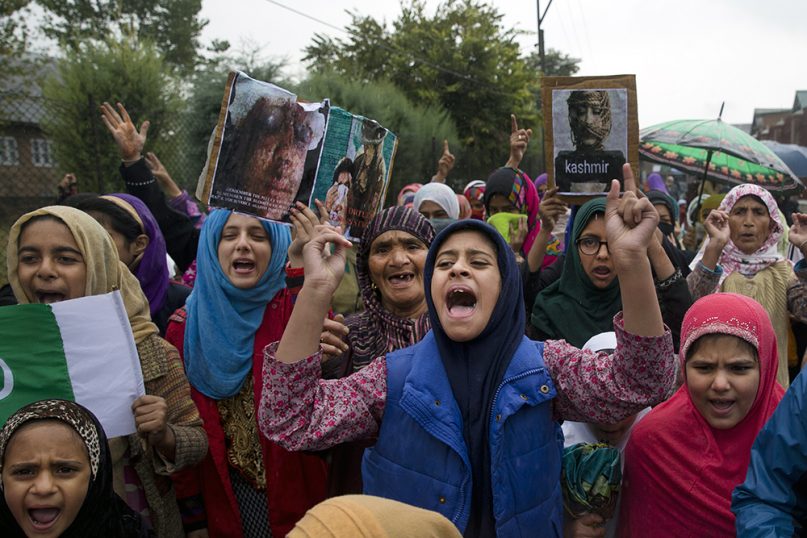
Kashmiri females shout slogans during a protest after Friday prayers against the abrogation of Article 370, on the outskirts of Srinagar, Indian-controlled Kashmir, on Oct. 4, 2019. For the last two months, mobile phone and internet services have been shut down in Kashmir after New Delhi stripped the region of its semi-autonomous powers and implemented a strict clampdown. The federal government has sent tens of thousands of extra troops to the region and detained thousands of people. (AP Photo/ Dar Yasin)
“Modi’s hands were stained in blood. He committed genocide against Muslims,” said Obed Manwatkar, a Christian missionary from Nagpur, India, who moved to Chicago two years ago. “So when he was elected I said, ‘Oh, the hatemonger is coming for us, too.’ They were taking their revenge on Muslims, and nowadays Christians are the secondary target also.”
Three years ago, a new attack against Christians was reported every 40 hours, according to a report by the All India Christian Council. The situation does not seem to have improved in the years since. A report last month from the Alliance Defending Freedom, a Christian advocacy group, documented 218 incidents of anti-Christian violence in India, including more than 150 acts of mass violence, in the first eight months of 2019. And in the last five years, the ADF has documented more than 1,000 acts of violence against Indian Christians.
In January, Open Doors International, an organization that works with persecuted Christians, published its annual World Watch List and ranked India as the 10th most dangerous country for Christians, sandwiched between Iran and Syria. Back in 2013, India ranked 31st. Its position has risen steadily since the BJP regained power in 2014.
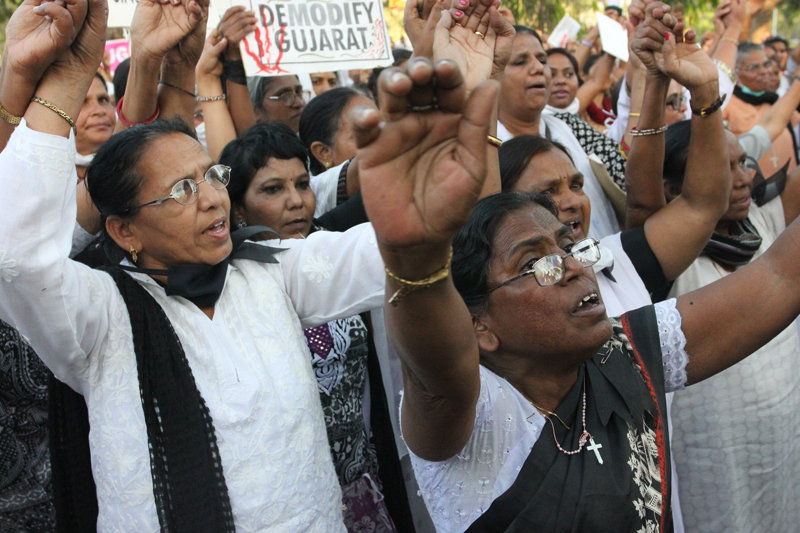
Christian women raise their hands and voices during a rally in Ahmedabad, Gujarat, after a nun was raped in Kolkata, West Bengal, in 2015. RNS photo by Arielle Dreher
Hindutva’s founder defined a Hindu nationalist as someone who equates the “homeland” with “the holy land,” explained the Freedom From Religion Foundation’s Amit Pal, author of a forthcoming book on Hindu nationalism.
“That leaves two major religions out of the equation,” Pal, who described himself as a cultural Hindu, told Religion News Service. “So Muslims and Christians are the No. 1 enemies, as well as secularists, which they see as a Western import.”
Jews, Baha’is and Parsis make up much smaller communities in India. Sikhs, Jains and Buddhists are by no means immune to religious persecution, either, but Pal noted that followers of these Indic religions are inaccurately viewed by Hindu nationalists as “junior Hindus” because of their historic ties to Hinduism.
Muslims and Christians, though, are seen with a special “contempt” as foreign interlopers or as “brainwashed” by colonizing forces, Manwatkar said.
“During Modi’s election there was a notion in the public that ‘Hey, our Hindu heartland is coming to power, so we will teach a lesson to Muslims and Christians,’” he said. “So now they kill Muslims in mob lynchings and they attack the churches in villages where the Christians are living.”
From January 2009 to October 2018, the Hate Crime Watch database documented violence related to religious bias in India and found that 90% of the reported incidents occurred after the BJP rose to power with Modi’s May 2014 election and 66% of the attacks were reported in states governed by the BJP. The incidents, which include violence related to interfaith couples, primarily targeted Muslims, but 14% of the incidents were against Christians.
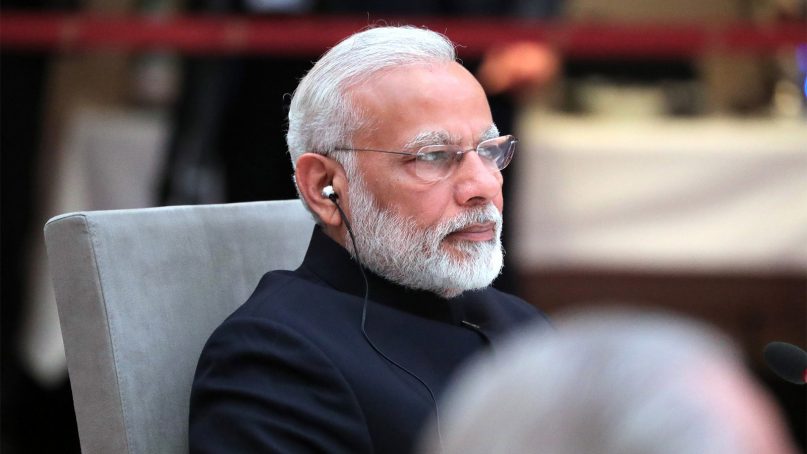
Indian Prime Minister Narendra Modi at a meeting in Hamburg, Germany, on July 7, 2017. Photo courtesy of the Kremlin
A pastor in India who is partnered with Open Doors told RNS that attitudes toward Christians began changing in 1996 when the BJP emerged as India’s largest single party. But in 2014, when Modi came into power and the BJP had gained control in many states, the pendulum swung even further right, he said.
“The religious minorities have always been threatened and persecuted, and there were many incidents that started happening since then,” said the pastor, Samuel. (The organization did not make his last name public to protect him and his congregants.) “The religious intolerance has increased and Hindu fanatic groups are getting stronger and violent because they have the support of the government. In the past couple of years the incidents of violence increased enormously.”
Open Doors’ dossier on India reports that according to information from church partners, about 12,512 Christians were physically attacked and 10 were killed due to their faith last year.
The attackers have largely been animated through “dangerous” rhetoric by right-wing politicians and mild condemnations of violence from BJP leaders, Samuel said, pointing to one leader’s 2014 declaration that Dec. 31, 2021, would be the last day for Muslims and Christians in the country.
Indeed, a survey by NDTV found that “communally divisive language” in elected officials’ speeches spiked nearly 500% between 2014 and 2018, with 90% of those speeches coming from BJP officials.
Attackers have also been emboldened by law enforcement’s tacit approval, advocates say.
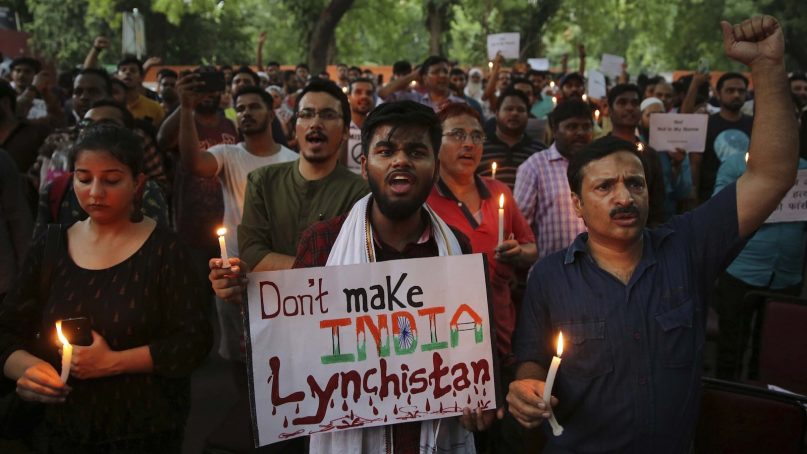
Indian protesters shout slogans as they hold placards and candles during a protest in New Delhi on June 26, 2019, condemning the recent mob lynching of a Muslim youth, Tabrez Ansari, in Jharkhand state. Since Prime Minister Narendra Modi took the helm of the Indian government, Hindu mobs have lynched dozens of people, mainly Muslims and lower-caste Dalits. (AP Photo/Altaf Qadri)
Manwatkar said he himself had to push local police and politicians to file a complaint three times after incidents on his local Christian community, noting several brutal attacks on Christmas caroling parties.
“When they attack the churches, demolish the churches and brutally beat up the pastors, the police and government agencies don’t pay attention and never write any FIR (police) reports against them,” Samuel explained. “On the contrary, they book pastors and church leaders and evangelists as criminals who are doing the crime of conversion of Hindus to Christians.”
Advocates say anti-conversion laws in eight Indian states have long been used to accuse Christians of “forcefully” converting individuals to Christianity. Some of these “religious freedom acts,” two of which passed under Modi’s tenure, criminalized religious conversion done by fraud, coercion and inducement. Some states require individuals to apply for permission from the government 30 days before converting to a new religion.
Now, reports indicate that the BJP-led government is also preparing a nationwide anti-conversion bill.
“There’s this fairly widespread false narrative that Hindus are being converted to Christianity en masse by bad Christian actors across the country, and that India — either the government or the population — needs to do something to put a stop to this,” explained William Stark, who manages cases related to persecution of Christians throughout South Asia for the International Christian Concern.
“Now, what ends up happening with these laws is they get pretty widely abused and very widely interpreted to cover basically all conversions,” Stark said. “So inducement could be interpreted as, ‘OK, I’m a Christian, and if you believe in Jesus Christ, you’ll get eternal life.’ Or ‘if you don’t believe in Jesus Christ, you’ll go to hell.’ Is that inducement? These are major tenets of Christianity.”
In August, the BJP-led northern state of Himachal Pradesh passed a strict anti-conversion law that can punish those convicted with up to seven years in prison. Such laws can offer an easy escape route to those involved in attacks on Christian communities, Stark said.
“One simply needs to claim a pastor was engaged in forceful conversions,” he said. “As a result, instead of the pastor’s assailants being arrested, it’s the assailed pastor who is sent to jail.”
The United States Commission on International Religious Freedom, which has repeatedly placed India as a Tier 2 country in minority persecution, noted that this fear of mass conversion seems to have spurred the 2017 shutdown of Compassion International, a Colorado-based Christian charity that provided meals, medical care and other services to about 150,000 Indian children.
The report also noted increased mob violence against Christians based on accusations of forced religious conversion, as well as stalled investigations and ignored procedures by police and prosecutions dealing with cases of anti-Christian attacks.
Some Hindu extremists are also using laws that regulate faith groups’ use of buildings and require permission for some religious activities in order to threaten and even close down churches, according to Religion Unplugged. About 100 churches were closed down last year, per the news organization’s analysis.
But Samuel emphasized that Christians’ legacy in the country is one of service, including convent schools, hospitals and relief organizations that provide services to all Indians.
“The church’s work has shaped and built the country, actually, in terms of the education, the health, the service,” he said. “But today they are portraying a negative narrative that whatever we are doing is for conversion. Hundreds of thousands of children have passed through those convent schools, and how many have converted to Christianity? Hardly anyone.”
Such narratives are having a powerful impact on policymakers and the population alike, Stark said, suggesting a “dangerous trajectory” for Christians that will involve more violent incidents and more policies like a national anti-conversion law.
“It also comes down to the grassroots efforts here in a place like the U.S. and Christian communities around the world,” he said. “When I mention that Christians in India are being persecuted, people say ‘no way.’ There definitely is ignorance around issues of persecution in places like India, which isn’t as readily recognized by the American public.”
Philips, the 21-year-old activist who grew up in Texas, said she often receives blowback for speaking about the effects of Hindu nationalism without having lived in India. But she said “condescending” Hindu nationalist attitudes toward Christians have bled into the global diaspora.
“The idea of being Hindu as equivalent to being Indian, and the rhetoric of Abrahamic faiths as a new thing or a foreign influence where someone from the outside came and converted you, is very much prevalent in the United States,” she said. “Indians here ask me things like, ‘Oh, did your parents convert when they came to the U.S.?’ And with my Muslim friends, people assume they’re not Indian because Indians aren’t viewed as anything but Hindu.”
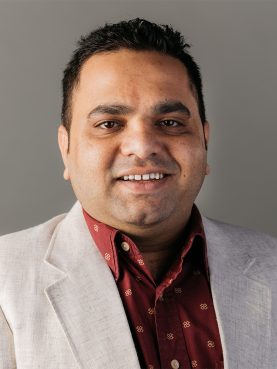
Obed Manwatkar. Courtesy photo
Manwatkar said he frequently experiences such dismissive or hostile views when he goes to Indian-owned grocery stores and gas stations in Chicago. Some have attempted to dissuade him from shopping at Muslim-owned stores, calling Muslims “terrible people.” One local grocer recently asked Manwatkar his caste; when he responded that he had none, the man asked his religion.
“I said, ‘I’m Christian, sir,’” Manwatkar recalled. “The uncle said, ‘Oh, you have been brainwashed by people, you should be a proud Hindu, we should be proud of the caste we are born in.’ I said, ‘Uncle, you should leave that garbage in India. Why are you soiling this beautiful country?’”
But Manwatkar said he remains hopeful for the future of India’s Christians.
“Christians, yes, they are living in fear right now,” he said. “They are afraid. Any second, they can be targeted. But the kingdom will come. Many Modis have come and gone before, and we will overcome.”
